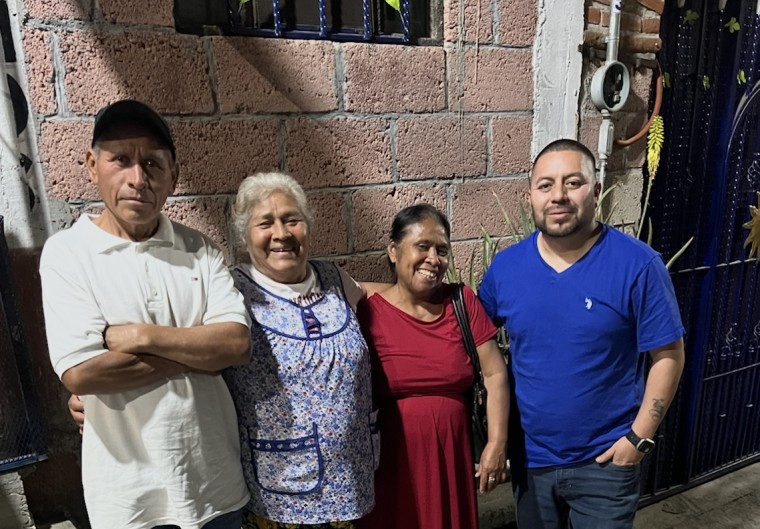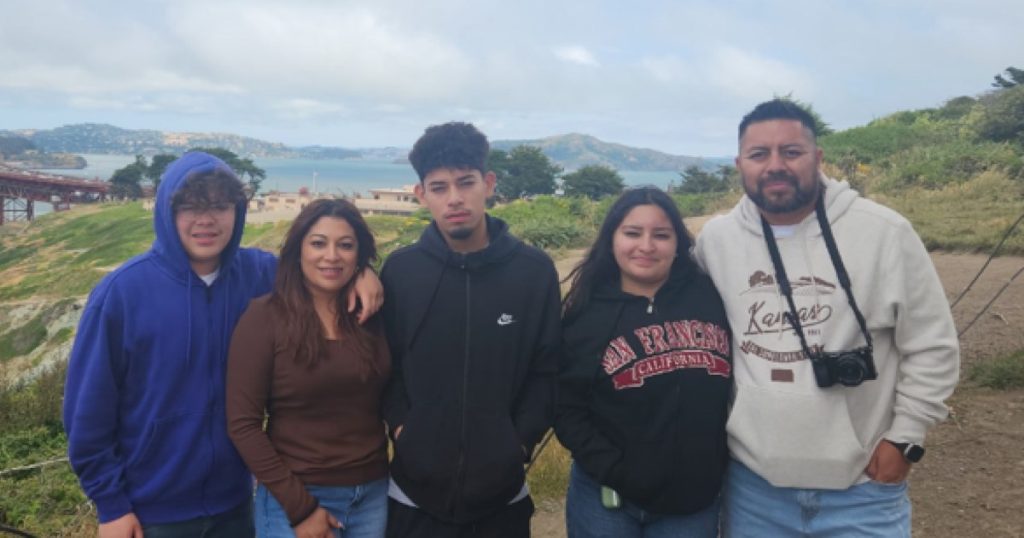Evenezer Cortez Martínez said he’s still scared and finds it hard to believe he’s back home in Kansas City, Missouri, with his wife and children, after being deported to Mexico by U.S. immigration authorities in March.
“I wake up every now and then saying, ‘this is a dream.’ When I look at my wife and my children, I feel joy, that peace, but I still have that doubt about whether it’s really true that I’m here,” he said, his voice breaking.
Cortez Martínez, a 40-year-old father of three and maintenance worker in the Shawnee Mission School District, was born in the Mexican state of Cuernavaca but came to the U.S. with his family when he was 4. He’s one of the hundreds of thousands of people who applied and qualified for the Deferred Action for Childhood Arrivals program, known as DACA, which allows young adults without legal immigration status who were brought to the U.S. as children to work and study without fear of deportation as long as they renew their DACA application every two years.
“I’ve lived here for 36 years; I grew up here. I have no knowledge of cities in Mexico or anything,” he said.
When his grandfather Cornelio Martínez Domínguez fell ill in Mexico, Cortez Martínez began the process of requesting advance parole, a travel permit that allows Dreamers (as DACA beneficiaries are known) to leave and return to the country.
Despite obtaining the travel permit and having valid DACA status, when Cortez Martínez returned to the U.S., immigration authorities at Dallas-Fort Worth International Airport prevented him from re-entering the country and deported him to Mexico on March 23.
“They told me I had a deportation order,” Cortez Martínez said, adding that he wasn’t allowed to consult a lawyer and was told he had to leave the country right away.
He was allowed to return home to Kansas City after spending two weeks in Mexico but said the experience was traumatic: “It was very stressful. I thought I had lost everything.”

No knowledge of an immigration hearing — or a deportation order
According to a legal complaint filed by Cortez Martínez’s attorney and reviewed by Noticias Telemundo, Customs and Border Protection detained Cortez Martínez at the Dallas-Fort Worth Airport, citing a deportation order issued in June 2024 in absentia, meaning it was issued when he didn’t show up to an immigration hearing. But Cortez Martínez and his attorney said he was never notified that he had a hearing — and he also didn’t know that a deportation order had later been issued.
“It often happens that people don’t receive notifications about things that happen in immigration court,” said Rekha Sharma-Crawford, Martinez’s attorney.
When he returned from his visit to Mexico in March, he was deported without being allowed to contact an attorney or hold a hearing before an immigration judge.
In legal documents, CBP claimed that Cortez Martínez’s advance parole had been “issued in error” and that it had the authority to deny re-entry under President Donald Trump’s expedited removal process.
The complaint argues that “an advance parole holder cannot be barred from entering the country without a formal removal hearing before an immigration judge,” among other things.
Sharma-Crawford maintains that Martinez was not hiding from authorities and that all of his DACA renewals (which take place every two years) had been approved by the government without incident. In fact, his current permit is valid until October 2026.
“What we asked of a federal judge was to hold the government accountable and have them recognize the legal documents [Cortez Martínez] had in his possession to allow him to re-enter the United States, which was obviously done, so that part is complete,” said the attorney, who doesn’t rule out taking other legal action to resolve the deportation order issued by the government.
“At this point, we’ve given him time to return to his family, stabilize, and return to work. We’ll address those issues in the future,” Sharma-Crawford said.
The Department of Homeland Security and Customs and Border Protection did not respond to request for comment from Telemundo News. The U.S. Citizenship and Immigration Services (USCIS) responded in a statement that, because of privacy rules, it does not comment “on individual immigration cases” and cannot “share, confirm, or deny information” about individuals.
What is advance parole?
Advance parole can be requested for humanitarian reasons, such as medical treatment abroad, visiting seriously ill relatives or attending funeral services, as was the case with Cortez Martínez. It can also be requested for educational purposes, for courses or academic research or for work-related reasons, such as to complete assignments abroad or attend interviews, conferences or meetings with international clients.
According to immigration experts and to the most recent federal information, USCIS continues to accept and approve advance parole requests for current DACA recipients as long as they qualify.
Regarding traveling back and forth with advance parole, USCIS said in a statement that admission back to the U.S. “is not guaranteed even if the appropriate documents are present.” The agency warned that any person is subject to “immigration inspection or examination at a port of entry to determine whether they may be admitted to the country and whether they are eligible for the immigration status for which they are applying.”
Ruby Powers, an immigration attorney in Texas, said that CBP agents can subject Dreamers to secondary inspections upon their return to the country.
“It’s discretionary because they have the authority to do so — maybe there’s something on their record they didn’t know about, and when they travel, authorities find out,” she said. “There could be a deportation order that was issued when they were children and their parents didn’t inform them or were never notified. The government could issue a travel ban to the very country they’re going to visit while they’re in the middle of a flight. So there are a number of things that could go wrong. … In the end, it all comes down to whether the immigrant chooses to take those risks.”
Lawyers and immigration experts say that while no specific changes have been announced by the Trump administration regarding the processing of advance parole for those who qualify — such as DACA recipients, TPS holders or those going through the asylum process — they recommend that anyone who qualifies and plans to travel abroad consult with their attorney before doing so.
“The main risk DACA recipients face when they leave the United States on advance parole is that the [DACA] program could be rescinded or terminated by the Trump administration while they are out of the country,” said Elizabeth Jacobs, director of regulatory affairs at the Center for Immigration Studies, a nonprofit organization that supports stricter immigration limits.
“In that case,” Jacobs said, “they may have trouble entering the country. Many DACA recipients could be subject to entry bans of three to 10 years.”
Over the past seven years, DACA has been the subject of multiple legal efforts from the first Trump administration and Republican states to eliminate the program. In January, the 5th Circuit Court of Appeals ruled against parts of DACA in Texas; there, new applicants will be protected from deportation but will not have work permits or be able to apply for driver’s licenses.
Cortez Martínez said that since returning home to Kansas City on April 8, he’s focused on returning to work and spending time with his family. Despite the stress of his deportation, he has some advice for DACA recipients who, like him, must travel outside the U.S.
“They need to check with a lawyer because it’s not just about leaving, it’s about returning,” he said, “and if they’re going through what I was going through, they shouldn’t stay silent and seek help. To qualify for DACA, we have to pass [background] checks, have a clean criminal record, and be good people. We pay taxes and support the U.S. economy, so we shouldn’t be afraid.”
An earlier version of this story was first published in Noticias Telemundo.


